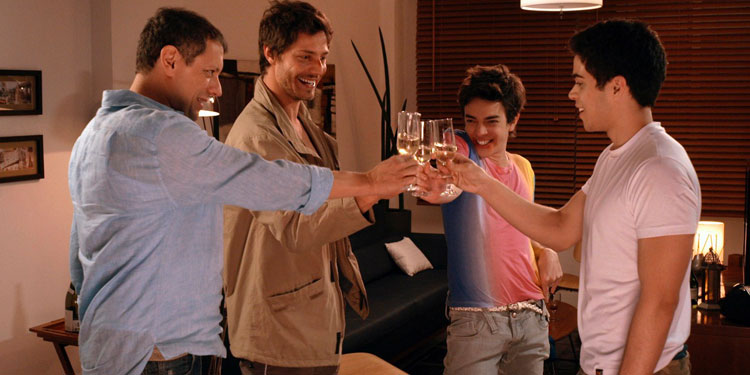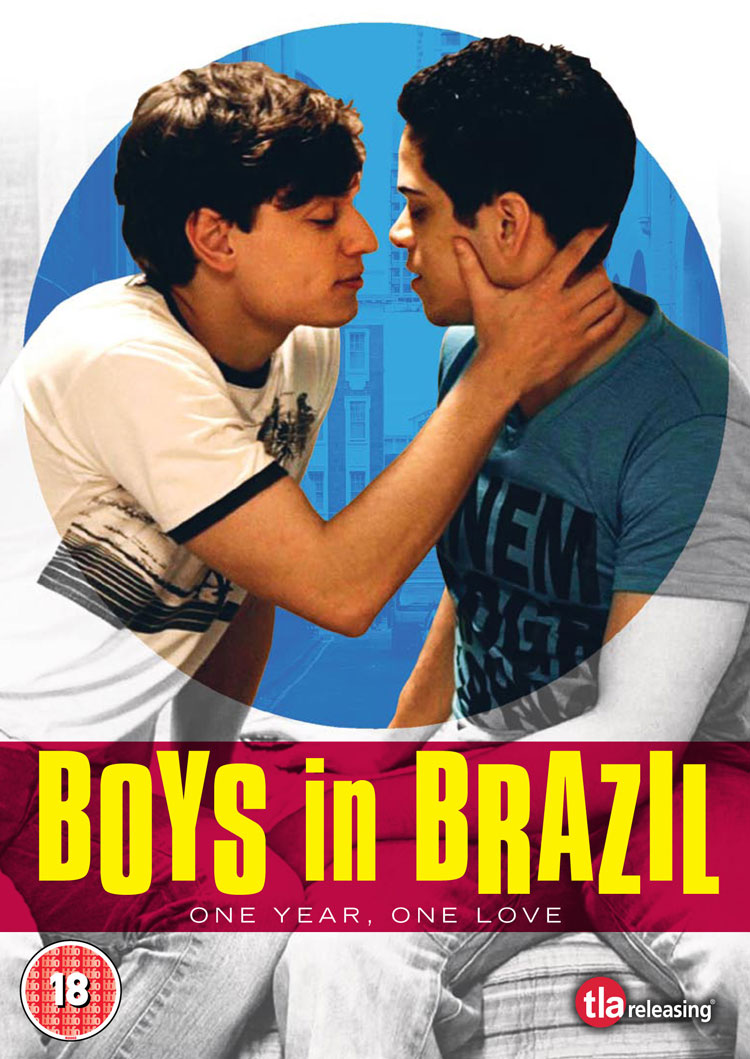
Director: Alexandre Carvalho
Running Time: 90 mins
Certificate: 12
Release Date: June 29th 2015 (UK)

Also known as The Pink Pact, Boys In Brazil follows four men – teenage friends Mauro and Rodrigo, Mauro’s uncle Vicente and a man they meet at Sao Paulo’s Pride Parade, Roger. After Roger is gay-bashed the quartet end up at Vincente’s apartment, where the outrageously camp Mauro decides that something must be done about the fact they are all in the closet. He makes them promise that by next year’s parade, they will have all come out.
Rodrigo is scared to tell his parents but does manage to embark on a relationship with a good-looking school friend. Vincente meanwhile is afraid to let his work colleagues know about his sexuality and even enlists his female friend to pose as his wife. Roger is married, has a child and his thoughts of escape get more complicated when he discovers his wife is pregnant again and has to be on bed rest until the baby comes.
Despite his general campness and desire to be a drag queen, Mauro’s parent have no idea their son is gay, and as they are very religious – complete with a tendency to think thing such as homosexuality are caused by demonic possession – coming out is a tricky proposition. However, can they all keep to the pact?
Boys In Brazil is one of those films where you want to give everyone a pat on the back for trying, while having to accept the results aren’t so great. While South America has produced some excellent gay-themed art films, there are far fewer that have attempted comedy and a more mainstream mentality. This film gives it a go, and I think perhaps 10 years ago it might have got a more sympathetic reaction, but now it seems oddly old-fashioned and at times a little cringe-inducing.
That’s not because of the issues it’s about (although admittedly fewer English-language movies directly address coming out than they used to), but due to the style of its humour and the fact it isn’t that funny. For example, while there’s nothing wrong with a bit of camp comedy, in virtually any other context Mauro would come across as an offensive stereotype.
The movie also delves into the well-worn but thankfully diminishing trend for gay films finding hilarity in a man lying to his wife about his sexuality. While Boys In Brazil doesn’t blame the wife as some other movies have done, it doesn’t appear to have much sympathy with her or her situation, instead solely commiserating with Roger as he lies and cheats. Indeed, there’s a whole section of the movie where we’re supposed to be cheering Roger on and hoping he will succeed in leaving his sick wife behind with their child by pretending he’s being forced to go on a work trip to Rio, while actually planning a secret tryst with Vincente.
To be honest it’s all rather clumsy, with its only charms coming from the fact its heart is in the right place and it’s all done fairly amiably. There are also a few moments where it touches on some very relevant and pretty serious subjects, most notably the persecution Mauro faces when his parents discover his desire to be a drag queen, but even here it tends to clash with what’s going on around it and also to undermine itself.
There is undoubtedly full marks for effort here, but in execution Boys In Brazil falls short.
Overall Verdict: Its mix of cliché and stereotype needed to be absolutely hilarious to work, but unfortunately Boys In Brazil isn’t particularly funny, and as a result it feels a little old-fashioned and rather staid.
Reviewer: Tim Isaac





Leave a Reply (if comment does not appear immediately, it may have been held for moderation)